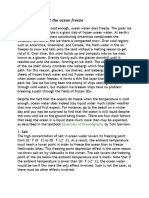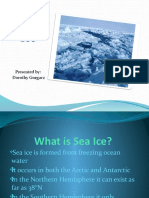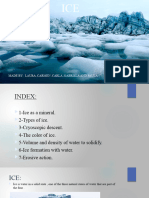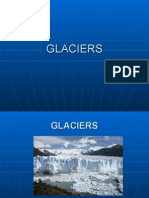0 ratings0% found this document useful (0 votes)
17 viewsIcescience
Icescience
Uploaded by
calebhomer2Science of ice
Copyright:
© All Rights Reserved
Available Formats
Download as PDF, TXT or read online from Scribd
Icescience
Icescience
Uploaded by
calebhomer20 ratings0% found this document useful (0 votes)
17 views1 pageScience of ice
Original Title
icescience (1)
Copyright
© © All Rights Reserved
Available Formats
PDF, TXT or read online from Scribd
Share this document
Did you find this document useful?
Is this content inappropriate?
Science of ice
Copyright:
© All Rights Reserved
Available Formats
Download as PDF, TXT or read online from Scribd
Download as pdf or txt
0 ratings0% found this document useful (0 votes)
17 views1 pageIcescience
Icescience
Uploaded by
calebhomer2Science of ice
Copyright:
© All Rights Reserved
Available Formats
Download as PDF, TXT or read online from Scribd
Download as pdf or txt
You are on page 1of 1
Ice Science
What is Ice? Glaciers, Ice Sheets and
Ice is frozen water. Icebergs.
Ice can float as it is You can see this at A glacier is a huge mass
less dense than home. Take a of compacted snow and ice
water. This means plastic drinks bottle that originates on land and
that for a given and fill it with water. moves downslope in
volume there would Freeze standing response to gravity.
be more water upright in your Ice sheets are large
molecules in liquid freezer. When you masses of ice which can
water than in solid take it out, the ice cover more than
water (ice). This is should be above the 50,000km2.
quite unusual – level you filled your Ice shelves are slabs of
when most liquids bottle to. So the glacier ice which float on
solidify, the solid volume of space the sea.
formed is more taken up by the Icebergs are large pieces
dense than the water is greater of glacier ice that have
liquid. when it is frozen. broken off and are now
The bonds between the water molecules in floating on water.
ice mean that ice takes up more space
than the same mass of liquid water. Melting Icebergs
Because of the relative
Glacier Ice densities of the ice and the
sea water, usually only 1/9 of
Ice is frozen water. But the ice that forms
the total iceberg is above sea
glaciers is quite different from the ice
level, the rest being below the
cubes you get from your freezer. Instead it
surface of the water.
is snow that has been compacted over
time – and all that compaction has given it When ice that is floating in water melts,
quite a different crystal structure. there is no change in water level. This can
be seen in the beakers here – an ice cube
Glaciers contain more than
has been placed in water in each one.
just ice. As they move over
Marked is the level of the water at the
the ground they pick up
beginning of the experiment. You can see
bits of soil, rock, and
that, as the ice melts, the water level
organic material. Glacial
remains about the same. Why do you think
ice also contains lots of
this is the case?
bubbles of air under great
pressure because of the So where does the rise in sea level from
amount of compaction. If the melting of ice come from? It comes
you put a piece of glacial from the melting of ice which is formed on
ice in a glass of water, the land. Icebergs have broken off glaciers
air in these bubbles rushes which were on land. We need to worry
out as the ice melts, and about the melting of ice sheets – the
could cause your glass to Antarctic ice sheet is the largest single
explode! mass of ice on Earth containing 30 million
km3 of ice! If this all melted, it would cause
sea levels to rise by 61.1metres!
You might also like
- Introduction To Ice Navigation PDFDocument24 pagesIntroduction To Ice Navigation PDFMarijaŽaper100% (2)
- Ac EPTDocument29 pagesAc EPTNisa Nisa100% (2)
- Introduction To Ice NavigationDocument24 pagesIntroduction To Ice Navigationgeims11No ratings yet
- Titanic Hit An Iceberg! Icebergs vs. Glaciers - Knowing the Difference - Geology Books for Kids | Children's Earth Sciences BooksFrom EverandTitanic Hit An Iceberg! Icebergs vs. Glaciers - Knowing the Difference - Geology Books for Kids | Children's Earth Sciences BooksNo ratings yet
- PL - Guide To Antarctic IceDocument32 pagesPL - Guide To Antarctic IcelunabascalNo ratings yet
- Introduction To Ice Navigation PDFDocument24 pagesIntroduction To Ice Navigation PDFLê BìnhNo ratings yet
- Ice NavigationDocument28 pagesIce NavigationgeorgesagunaNo ratings yet
- J. 2019 Bowditch - Volume 1 - Part 8 Ice and Polar Navigation Chapter 32-33Document57 pagesJ. 2019 Bowditch - Volume 1 - Part 8 Ice and Polar Navigation Chapter 32-33Sydney HansonNo ratings yet
- Met O ReviewerDocument17 pagesMet O ReviewerjanalexpotenteNo ratings yet
- B I HE KEY Stages IN THE Formation OF SEA ICE Until IT IS ONE Year OLD SEA ICEDocument5 pagesB I HE KEY Stages IN THE Formation OF SEA ICE Until IT IS ONE Year OLD SEA ICERigel NathNo ratings yet
- Ground WaterDocument30 pagesGround WaterJackielyn AbasNo ratings yet
- Glaciers - How They Form, Types of Glaciers, and Why Glaciers Are ImportantDocument4 pagesGlaciers - How They Form, Types of Glaciers, and Why Glaciers Are ImportantFlorence FlorahNo ratings yet
- Ice - Wikipedia, The Free EncyclopediaDocument10 pagesIce - Wikipedia, The Free Encyclopedia01tttNo ratings yet
- Revised Ice Notes - Updated On 26-05-23Document98 pagesRevised Ice Notes - Updated On 26-05-23Rahul RaiNo ratings yet
- Types of Ice. Basic Ice PhysicsDocument77 pagesTypes of Ice. Basic Ice PhysicsAnte AjdučićNo ratings yet
- WhatDocument2 pagesWhattito operaNo ratings yet
- Ice at Sea PDFDocument14 pagesIce at Sea PDFRagunath RamasamyNo ratings yet
- SST 2Document2 pagesSST 2Hemaraj BenachannavarNo ratings yet
- GlaciersDocument10 pagesGlaciersmusafrehman1No ratings yet
- Explain With The Help of Suitable Diagram, The Sequential Formation of Sea IceDocument6 pagesExplain With The Help of Suitable Diagram, The Sequential Formation of Sea IceRagunath Ramasamy100% (1)
- Interesting Facts About Glaciers - Geology for Beginners | Children's Geology BooksFrom EverandInteresting Facts About Glaciers - Geology for Beginners | Children's Geology BooksNo ratings yet
- Melting Ice GlaciersDocument6 pagesMelting Ice Glaciersapi-524144216No ratings yet
- 9 Dorothy Sea Ice 2010Document13 pages9 Dorothy Sea Ice 2010waqas20No ratings yet
- Ice Is: Here Is The Story of When I Was A Little Kid. I Looked in The Ice and Discovered A HulkDocument2 pagesIce Is: Here Is The Story of When I Was A Little Kid. I Looked in The Ice and Discovered A HulkAlexandre LecoursNo ratings yet
- 6SCI Greenland - ArticleDocument4 pages6SCI Greenland - ArticleeedacengizNo ratings yet
- ArticleDocument2 pagesArticlearnavnikam234No ratings yet
- Sea Ice: Fast Ice Versus Drift (Or Pack) IceDocument9 pagesSea Ice: Fast Ice Versus Drift (Or Pack) IceIngbor99No ratings yet
- Glacier and Periglacial LandformsDocument4 pagesGlacier and Periglacial LandformsPeter PerezNo ratings yet
- Glaciers Notes Part 1Document6 pagesGlaciers Notes Part 1David ZhaoNo ratings yet
- Glaciers and Glaciation: Definition of A GlacierDocument9 pagesGlaciers and Glaciation: Definition of A GlacierHarsh DevNo ratings yet
- Glaciers and Glaciation: Definition of A GlacierDocument9 pagesGlaciers and Glaciation: Definition of A GlacierS Hashim RizviNo ratings yet
- GEO 110 NotesDocument9 pagesGEO 110 Notesali0% (1)
- IcebergDocument2 pagesIcebergVishal RNo ratings yet
- Download ebooks file Australian master tax guide : tax year-end 2019. Cch Australia Limited all chaptersDocument22 pagesDownload ebooks file Australian master tax guide : tax year-end 2019. Cch Australia Limited all chaptersmejedjougo100% (2)
- Hydrosphere G11Document21 pagesHydrosphere G11magallanoeryza4No ratings yet
- Glacier Course MIT Earthsurface 7Document81 pagesGlacier Course MIT Earthsurface 7Iván Cáceres AnguloNo ratings yet
- Glaciers Science Matters CompressDocument23 pagesGlaciers Science Matters CompressumairaNo ratings yet
- Why Sea Ice Matters National Snow and Ice Data CenterDocument1 pageWhy Sea Ice Matters National Snow and Ice Data Centerhoanghai090112No ratings yet
- Example 3: 1 TemperatureDocument1 pageExample 3: 1 TemperatureKhang TienNo ratings yet
- RemNote ESCI LESSON 8Document5 pagesRemNote ESCI LESSON 8Sharlaine TandinganNo ratings yet
- Ice - 6Document5 pagesIce - 6Ashis MingalaNo ratings yet
- Chapter 8 Glaciation PerfectDocument24 pagesChapter 8 Glaciation PerfectAmigoes CyberNo ratings yet
- A Study - : by Capt. Francis T. GauciDocument145 pagesA Study - : by Capt. Francis T. GauciCarmen DarmaninNo ratings yet
- Presented By: Moises Malone R. MontealegreDocument47 pagesPresented By: Moises Malone R. MontealegreClifford Cobsilen Jr.No ratings yet
- Summary ExtractDocument1 pageSummary ExtractAbdullah BhattiNo ratings yet
- CryosphereDocument20 pagesCryosphereJG MercadoNo ratings yet
- Glaciers Reaction PaperDocument1 pageGlaciers Reaction PaperJay AnnNo ratings yet
- OceanographyDocument19 pagesOceanographyIan AnonasNo ratings yet
- Ice - Age - Spring 2024Document42 pagesIce - Age - Spring 2024Chandreyee ChakrabortyNo ratings yet
- CRYO2Document3 pagesCRYO2Rossanah Mae PepitoNo ratings yet
- ICE Power Point 2Document10 pagesICE Power Point 2mmamichulaa03No ratings yet
- Short Paper GlacierDocument4 pagesShort Paper GlacierBrittany DelaCruzNo ratings yet
- Mountains 101 Lesson 6: Glaciers: Course NotesDocument6 pagesMountains 101 Lesson 6: Glaciers: Course NotesZadem PintoNo ratings yet
- ICE AT SEADocument45 pagesICE AT SEAaditya2005aroraNo ratings yet
- Glaciers and GlaciationDocument2 pagesGlaciers and GlaciationVera BalmesNo ratings yet
- GlacierDocument2 pagesGlacierJuan Paulo LinzaganNo ratings yet
- Group 6Document19 pagesGroup 6ROMAN, Geoford A.No ratings yet
- GlaciersDocument58 pagesGlaciersapi-3706215100% (3)
- The Week Junior USA 06-7-2024 Freemagazines TopDocument32 pagesThe Week Junior USA 06-7-2024 Freemagazines TopEries AU YEUNG100% (1)
- De Thi Chinh Thuc Chuyen Anh 2015 2016 Version 1Document8 pagesDe Thi Chinh Thuc Chuyen Anh 2015 2016 Version 1Biên Phạm100% (1)
- Download full Ice Nature and Culture Earth Dodds ebook all chaptersDocument40 pagesDownload full Ice Nature and Culture Earth Dodds ebook all chaptersvoreseckert100% (4)
- Value Engg. Fast and FcwaDocument5 pagesValue Engg. Fast and FcwaMukhil RajasekaranNo ratings yet
- 9/17/24, 6 46 AM Page 1 of 13Document13 pages9/17/24, 6 46 AM Page 1 of 13ericzheng105No ratings yet
- Sqa Nav Theory 2015 To 2019 UpdatedDocument196 pagesSqa Nav Theory 2015 To 2019 Updatedvijay bhatiaNo ratings yet
- Summer Stay On Track 3 To 4Document17 pagesSummer Stay On Track 3 To 4Sunmeet KaurNo ratings yet
- Sea Ice Nomenclature March 2014Document121 pagesSea Ice Nomenclature March 2014magnepetNo ratings yet
- Types of Ice. Basic Ice PhysicsDocument77 pagesTypes of Ice. Basic Ice PhysicsAnte AjdučićNo ratings yet
- Formation and Characteristics of Icebergs, GlacierDocument75 pagesFormation and Characteristics of Icebergs, GlacierDENWIL VINCENT MONERANo ratings yet
- 7 Habitude The IceburgDocument1 page7 Habitude The Iceburgapi-513128666No ratings yet
- Online Practice Tests First Keys Audio Scripts BDocument7 pagesOnline Practice Tests First Keys Audio Scripts Bkamy800100% (1)
- Unit+7+Exercise+Page StudentDocument2 pagesUnit+7+Exercise+Page Studentnguyen thaoNo ratings yet
- Đề Thi Hsg 2021 - 2022 Chinh ThucDocument8 pagesĐề Thi Hsg 2021 - 2022 Chinh Thucdaohaianh267No ratings yet
- Map of AntarcticaDocument35 pagesMap of AntarcticasarayooNo ratings yet
- Alluria - Cerulean Seas, Indigo IceDocument114 pagesAlluria - Cerulean Seas, Indigo IceJoe Dickerson100% (4)
- AEHelp IELTS Test Book 2Document186 pagesAEHelp IELTS Test Book 2Ninh Nguyên100% (1)
- Midterm Test English 0111.1.2546Document7 pagesMidterm Test English 0111.1.2546kamolpan@gmail.comNo ratings yet
- A Study - : by Capt. Francis T. GauciDocument145 pagesA Study - : by Capt. Francis T. GauciCarmen DarmaninNo ratings yet
- 5 Ice On SeaDocument24 pages5 Ice On SeaMD hidtzNo ratings yet
- MyPractice - Question Bank - Results 2Document96 pagesMyPractice - Question Bank - Results 2Ruday GandhiNo ratings yet
- Geography: Pre-Junior Cycle Final Examination 2024Document31 pagesGeography: Pre-Junior Cycle Final Examination 2024kutlwanofredrickNo ratings yet
- Dystopian Wars GeneratorsDocument2 pagesDystopian Wars GeneratorspelutsNo ratings yet
- English 3 Scientific Work BookDocument76 pagesEnglish 3 Scientific Work BookNada NadaNo ratings yet
- Winter and Heavy Weather Presentation - Presentation - Rev.0-Dd - Mm.yyDocument196 pagesWinter and Heavy Weather Presentation - Presentation - Rev.0-Dd - Mm.yymckhoy_10100% (1)
- IAATO Operational Dos and Don'ts - enDocument1 pageIAATO Operational Dos and Don'ts - enWill TraynorNo ratings yet
- Geo Lecture9 PDFDocument46 pagesGeo Lecture9 PDFKASSANDRA DENISE DIMAAPINo ratings yet
- ĐỀ LUYỆNDocument49 pagesĐỀ LUYỆNtrannguyentienminh2k7No ratings yet
- Pas Kelas 12 Bahasa InggrisDocument6 pagesPas Kelas 12 Bahasa Inggrisreksi alimNo ratings yet























































































